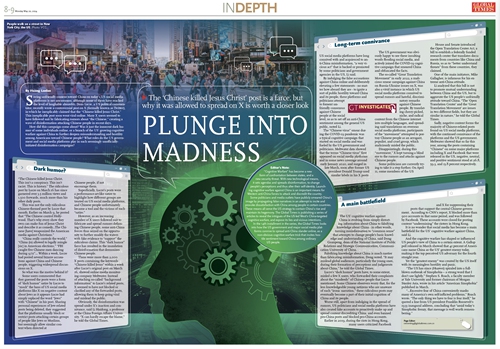KUALA LUMPUR: The planned introduction of e-invoicing will be both redundant and cause more trouble than it is worth, says Datuk Seri Dr Wee Ka Siong.
The MCA president said the government’s push to prevent tax evasion could be easily solved by the reintroduction of the Goods and Services Tax (GST) rather than e-invoicing.
“If we look at GST previously, we didn’t need to mandate this (invoicing) as it was already an automatic mandatory component of GST for those that wanted to get their tax refunds.
“This made it a two-in-one solution as the government didn’t need to make any sort of invoicing compulsory as businesses were forced to produce clear records to claim tax refunds,” he said in a video on his Facebook page yesterday.
Dr Wee, who is the Ayer Hitam MP, also noted how the frequently changing guidelines – currently at version 2.1 – by the Inland Revenue Board were causing unnecessary confusion.
“This is already the sixth version and every few days it changes.
“How is anyone expected to keep up with this constant development, especially as it’s a complete system transition
“I understand there is also no significant allocation for any workshops or campaigns to educate businesses on how to transition.
“This is a serious issue, as they need to know the transition process in order to be able to comply with it,” he said, adding that the new system could disproportionately impact small businesses negatively.
“This is because compliant businesses will need to digitalise all their business transactions through e-invoices that smaller businesses don’t need to provide.“As such, larger businesses may be discouraged or even indirectly banned from engaging with smaller businesses due to the need for e-invoices that smaller businesses cannot provide.
“This effectively forces smaller businesses to have to implement e-invoicing if they want to engage with bigger businesses,” he said.
Dr Wee noted that the requirement for businesses to fill out 55 data fields for e-invoicing, which carries a penalty of up to RM20,000 for each error, worsens the situation. This exposes businesses to additional financial strains, such as paying fines or hiring administrative or accounting professionals to complete the data.
“How many people understand what a credit note and a debit note are? The big businesses may be fine, but the small ones will have to pay experts to help them solve this,” he said, adding that security and tax data privacy concerns must also be addressed ahead of the new digital system’s implementation.
“Having all 55 data fields from various big businesses collected and stored in a central database makes it a prime target for hackers.
“We still don’t know what cybersecurity measures they may have to defend the system,” he said.
The e-invoicing system will be rolled out gradually starting on Aug 1, and eventually be extended to all taxpayers by July 1, 2025.
Prime Minister Datuk Seri Anwar Ibrahim has said the e-invoicing system will be applied first to taxpayers who earn an annual income exceeding RM100mil.
Source link
e invoicing Malaysia solution - Malaysia IRBM e-invoicing
ADVERTISING
KUALA LUMPUR: The planned introduction of e-invoicing will be both redundant and cause more trouble than it is worth, says Datuk Seri Dr Wee Ka Siong.
The MCA president said the government’s push to prevent tax evasion could be easily solved by the reintroduction of the Goods and Services Tax (GST) rather than e-invoicing.
“If we look at GST previously, we didn’t need to mandate this (invoicing) as it was already an automatic mandatory component of GST for those that wanted to get their tax refunds.
“This made it a two-in-one solution as the government didn’t need to make any sort of invoicing compulsory as businesses were forced to produce clear records to claim tax refunds,” he said in a video on his Facebook page yesterday.
Dr Wee, who is the Ayer Hitam MP, also noted how the frequently changing guidelines – currently at version 2.1 – by the Inland Revenue Board were causing unnecessary confusion.
“This is already the sixth version and every few days it changes.
“How is anyone expected to keep up with this constant development, especially as it’s a complete system transition
“I understand there is also no significant allocation for any workshops or campaigns to educate businesses on how to transition.
“This is a serious issue, as they need to know the transition process in order to be able to comply with it,” he said, adding that the new system could disproportionately impact small businesses negatively.
“This is because compliant businesses will need to digitalise all their business transactions through e-invoices that smaller businesses don’t need to provide.“As such, larger businesses may be discouraged or even indirectly banned from engaging with smaller businesses due to the need for e-invoices that smaller businesses cannot provide.
“This effectively forces smaller businesses to have to implement e-invoicing if they want to engage with bigger businesses,” he said.
Dr Wee noted that the requirement for businesses to fill out 55 data fields for e-invoicing, which carries a penalty of up to RM20,000 for each error, worsens the situation. This exposes businesses to additional financial strains, such as paying fines or hiring administrative or accounting professionals to complete the data.
“How many people understand what a credit note and a debit note are? The big businesses may be fine, but the small ones will have to pay experts to help them solve this,” he said, adding that security and tax data privacy concerns must also be addressed ahead of the new digital system’s implementation.
“Having all 55 data fields from various big businesses collected and stored in a central database makes it a prime target for hackers.
“We still don’t know what cybersecurity measures they may have to defend the system,” he said.
The e-invoicing system will be rolled out gradually starting on Aug 1, and eventually be extended to all taxpayers by July 1, 2025.
Prime Minister Datuk Seri Anwar Ibrahim has said the e-invoicing system will be applied first to taxpayers who earn an annual income exceeding RM100mil.
Source link
e invoicing Malaysia solution - Malaysia IRBM e-invoicing













